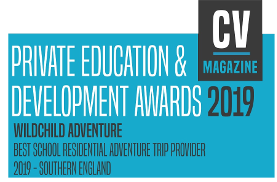Get the most from your school residential trip: 10 top tips
Overnight school residential trips are the highlight of most school children’s year – if not their entire school life! The chance to have some out of school fun time away from the classroom but with all their friends, AND they get to stay the night! How exciting is that?
As a teacher, it’s just as refreshing having time out of school and the opportunity to engage with and teach children in a new and different setting. With that however comes numerous challenges – managing children’s excitement and expectations, ensuring the right procedures are in place, safeguarding, and the preparation that will go into not just making sure the trip runs smoothly, but that it fulfils its objectives and makes a positive impact on children’s learning.
At Wildchild we have hundreds of teachers join us each year on their school residential trip. These are our top tips from teachers we’ve worked with, on what they found most useful to help them get the most from their school trip.
Create links between the classroom and the trip well in advance.
Whether it’s a Year 6 reward, or a geography field trip, a school residential trip provides an important learning opportunity. Use it to add a further dimension to classroom learning, and start to integrate the key learning objectives into your curriculum well in advance of the trip. Think about setting goals and objectives, things pupils should aim for.
Whether it’s looking for a particular geological find, or setting goals around teamwork, overcoming fears or trying new activities – setting objectives for your school residential trip in advance means pupils have a better idea of what to expect, and can use their experience to enhance their classroom learning.
Get parents on board
Parents will be naturally nervous about their child being away from home, and, as it’s likely they will be paying for or toward the trip, they will want to know how their money is being spent, and how their child will benefit. Keeping parents informed from the outset will alleviate concerns and ensure they can better support and prepare their children for their school residential trip. Ensure support from parents by:
– Sharing learning objectives
– Circulating trip information including itinerary, kit list, emergency procedures, and information on the trip provider.
– Inviting parents to a meeting where you can share information on the trip and address any questions or concerns.
This is also a good opportunity for you to set out learning objectives, behaviour policies etc.
Get teachers involved
School residential trips provide valuable opportunities for breaking down barriers between teachers and pupils. It’s likely there will be an external provider providing some or all of the activities, so teachers are free to get involved themselves, alongside their pupils, building relationships and improving communication without the normal teacher/pupil relationship restrictions in place. When planning the school residential trip think about inviting teachers that would benefit the most from this relationship building experience, and brief them in advance so they come prepared to be active participants, rather than simply adopting the role of chaperone.
Build resilience – encourage wins and losses
On the school residential trip pupils will benefit from the opportunity to try new activities, and there are likely to be winners and losers. Use the opportunity to build resilience by teaching children that it’s okay to lose. Reward and acknowledge the achievement of personal goals, and encourage perseverance over and above simply coming first, or climbing highest.
With your learning objectives and itinerary in mind, think about setting goals in advance for different elements of the residential trip – teamwork, social skills, resilience etc. Take the time to observe and record individual successes and achievements over the course of the trip, and build in time either during the trip or back in the classroom for sharing and celebrating these with the whole group. If every child comes away with at least one thing they can be proud of that has been recognised and celebrated by their peers, this will go a long way to building confidence and reinforcing positive behaviour.
Let the pupils take the lead on their school residential trip
Time spent away from the classroom could provide a rare opportunity for pupils to take the lead. Encourage pupils to adopt leadership roles, modelling behaviour and for activities where they may feel more confident, showing the group how it’s done, before supporting them as they take part. You may find pupils that are quiet and disengaged in class come into their own when taking on these new activities. Encouraging them to build on their strengths and take the lead in supporting their peers will build confidence that will benefit them on the school residential trip, and back in the classroom.
Record your school residential trip for posterity
Don’t forget to document your trip. As well as providing a reference point to guide work back in the classroom, it can also double as a way to share the trip highlights with the school and parents. Encourage pupils to write a diary, and build time into the daily agenda for them to reflect on their day and write their diary entry. If practical, think about a daily blog that you could share on your school’s social media so parents can see what their children are up to, while also giving prospective parents an insight into the interesting and engaging educational experiences your school provides. Take lots of photos and, if possible, videos, and as a post-trip task set pupils the challenge of editing them down to create a video diary documenting the event.
Embed the learning back in the classroom
After the residential trip children will return to the classroom energised, motivated and inspired. Use this newfound energy to embed the learning and social development of the past few days back in the classroom. Whether it’s through creative writing, a science or geography project using some of the things learned on the trip, building ICT skills through the editing of the school residential trip video, or the development of creative artwork incorporating some of the materials, or scenery from the trip.
A school residential trip is the ideal opportunity for re-energising pupils and teachers to enhance and improve the classroom learning experience. Click here for more information on a Wildchild school residential trip
Recent Posts
- Why you should be insisting on LOtC for your school residential trips
- The impact of Nature deficit disorder and the preventative role schools can play
- Residential trips for secondary schools to ease transition
- Building character through primary school trips
- Six reasons why more schools are choosing UK school trips (spoiler alert: it’s not because of Covid!)
- School trips after the pandemic
- 5 winter outdoor learning activities for schools
- 5 ways to get more from your School Bushcraft Trip
- Residential trips to benefit learning
- Perfect Primary School Trip Planning
Blog home






